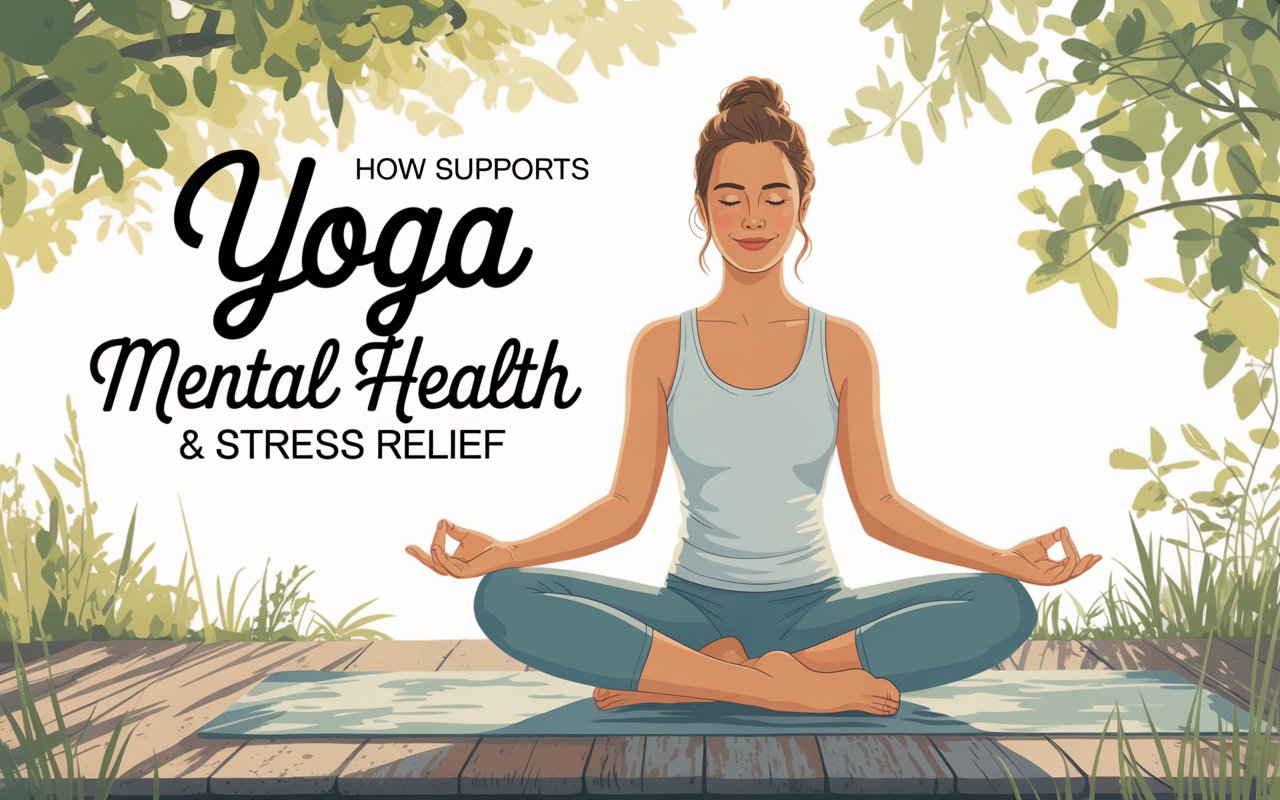In today’s fast-paced world, mental health challenges like anxiety, stress, and emotional fatigue are more common than ever. With long working hours, constant digital overload, and limited time for self-care, people are turning toward holistic methods for relief. One ancient practice is gaining renewed attention: Yoga.
Far beyond just flexibility and fitness, yoga offers a powerful gateway to mental clarity, emotional balance, and stress relief. But how exactly does it help?
🌿 What Is Yoga, Really?

At its core, yoga is a blend of physical movement (asanas), controlled breathing (pranayama), and mindful awareness (meditation). Rooted in ancient Indian philosophy, it was designed to harmonize the body, mind, and soul. Over the years, modern science has begun to recognize yoga’s potential—especially in improving mental health.
🧘 Yoga Reduces Stress Naturally

When you’re stressed, your body releases cortisol, often called the “stress hormone.” Prolonged high cortisol levels can lead to fatigue, weight gain, and emotional burnout. Yoga, particularly practices like deep breathing and restorative poses, lowers cortisol and activates the parasympathetic nervous system—helping your body relax deeply.
Popular stress-relieving poses:
Child’s Pose (Balasana)
Legs-Up-The-Wall (Viparita Karani)
Cat-Cow Stretch (Marjaryasana-Bitilasana)
🧘♀️ Improves Emotional Balance

Yoga encourages self-awareness and acceptance. Through slow, mindful movement and breathwork, the brain becomes less reactive to negative thoughts. Regular practice can help manage conditions like:
Anxiety
Mild to moderate depression
Panic attacks
Breath-based techniques such as Nadi Shodhana (alternate nostril breathing) and Bhramari (humming bee breath) are shown to reduce anxiety and calm the mind.
🌼 Boosts Mood & Mindfulness

A consistent yoga routine increases serotonin and GABA (gamma-aminobutyric acid)—neurotransmitters responsible for happiness and calmness. This is why many people report feeling uplifted and mentally refreshed after just 30 minutes of practice.
Mindful yoga styles like Hatha Yoga, Yin Yoga, or Yoga Nidra promote a grounded, peaceful state that supports long-term emotional well-being.
📱 A Digital Detox You Didn’t Know You Needed

We live in a hyper-connected world. Scrolling through social media or emails before bed has become the norm, leading to mental fatigue and sleep issues. Yoga encourages intentional pauses. Even 10 minutes of movement and breathwork can serve as a reset button, reducing the mental clutter caused by constant stimulation.
👵 Accessible for All Ages & Lifestyles

You don’t need to be flexible or super fit to start yoga. Whether you’re a student, a busy parent, or a senior, there’s a yoga style suited for you. Practices like Chair Yoga or Gentle Flow make mental health support available to everyone—anytime, anywhere.
✅ Scientifically Backed Benefits
Recent studies from Harvard Medical School, the American Psychological Association, and WHO suggest that yoga:
Lowers anxiety symptoms
Improves sleep quality
Reduces PTSD markers
Enhances emotional resilience
🌟 Tips to Get Started
Start small – Just 10–15 minutes a day can make a difference.
Choose a style – Try calming practices like Yin, Restorative, or Hatha.
Be consistent – Make it a daily or weekly habit.
Focus on your breath – Let your breath guide your mind toward peace.
💬 Final Thoughts
Yoga is more than a workout—it’s a lifestyle change. For anyone struggling with mental fog, emotional ups and downs, or chronic stress, yoga offers a gentle, effective solution. It empowers you to reconnect with yourself and find stillness amid chaos.
So roll out your mat, take a deep breath, and let your journey to mental wellness begin.

